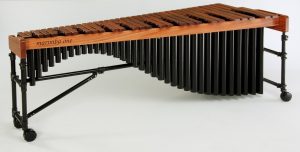History and Information
The marimba is a pitched percussion instrument consisting of wooden bars that are struck with mallets. It is a member of the idiophone family of instruments, which also includes the xylophone and the vibraphone. While the instrument most likely has its origins in Western Africa, the modern marimba was invented in the 18th century, in Guatemala. The marimba is often used in jazz, pop, rock, and folk music, in addition to a large classical repertoire.
When to Start
Students can start marimba lessons as young as age 6. However, because it is such a large instrument, younger students may feel more comfortable starting on another percussion or keyboard instrument and then switching to the marimba when they are physically able to do so. Most instructors will incorporate reading music into their lessons, so students should know at least some reading and counting fundamentals.
Getting a Marimba
There are many brands and models of marimbas available. It is a very large instrument that will take up a significant amount of space in your home; there are digital versions available from some shops. It also can be very expensive, although most music stores will offer rental instruments. For very young students, it is especially recommended to rent for two reasons: 1) they will most likely grow out of instruments quickly and 2) they may lose interest (although we hope they don’t!). Most stores will provide repair services for instruments that they rent out. We can give you recommendations for places near you to buy or rent your marimba or digital alternative. Please contact us, and be sure to include your location!
Books and Supplies
Your instructor can tell you which books and supplies are appropriate. Most books and many supplies, including mallets, are available online. We can recommend stores near you where you can purchase supplies and music for your marimba, if you prefer to do so in person. Please contact us, and again, remember to tell us where you live!
**Feel free to contact us with any questions you may have. We can help provide you with additional resources.**

